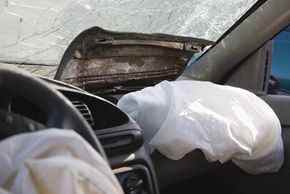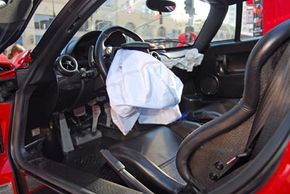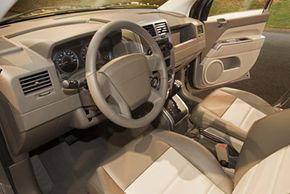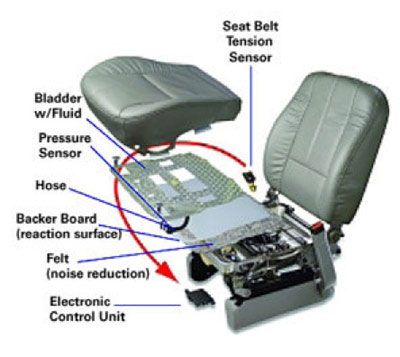The National Insurance Crime Bureau claims that thieves in the United States make off with about 50,000 airbags -- worth about $50 million -- each year. The numbers would be even higher if not for older cars still on the road without airbags in them to steal [source: State Farm]. Why would thieves want an airbag in the first place?
Airbags are expensive. The bag itself must be replaced, along with any damaged steering wheel and/or dashboard parts. The sensors and other electronics must also be replaced. It's also a very labor intensive job: An airbag has to be installed by a trained technician. For example, replacing both front airbags in a 1994 Ford Taurus costs roughly $1,800, not including labor [source: Moore]. If the car had side airbags, the cost would be even higher. Despite their cost, airbags are relatively easy to remove, transport and store. The result? A thriving black market for stolen airbags. An unscrupulous mechanic can buy a stolen airbag illegally for $200, then charge the customer the full price and pocket the difference.
In fact, stealing airbags has become so lucrative that some dirty repair shops have gotten into the act themselves. Instead of a thief breaking into your car and yanking out the airbag, which sometimes requires the little more than the removal of just four bolts, mechanics can remove them at their leisure while they "repair" your vehicle.
In one version of the scam, "the pullout," your old airbag is pulled out to look as if it deployed in the accident (even though it actually didn't). Mechanics then replace it with a cheap bag they bought on the black market, or don't replace it at all. Either way, they bill you or your insurance company for the full price of a new airbag.
Another version of the scam, "the switch," happens when you've been in an accident but your airbag didn't actually deploy. Your original airbag is removed, and then another deployed airbag is put in its place. The mechanics bill your insurance company for an airbag replacement, but simply put your old airbag back in. They might also sell your airbag and replace it with a cheap version, or replace it with old rags or similar materials. Without a thorough inspection by a qualified technician, it's impossible to tell if a real airbag is still in place and functional.
Getting a cheaper airbag installed in place of the original might be a scam, but is it really that bad? Lots of airbags are for sale on eBay, so used and undeployed airbags can't be totally bad, right? A used airbag can be a good deal -- if it meets several conditions:
- It was properly and professionally removed
- It's the right airbag for the car -- there is no one size fits all airbag
- It's properly installed by a trained mechanic
Of course, if the used airbag was installed as part of a repair shop scam, how many of those conditions do you think the airbag actually met? Likely none.
Learn how to prevent thieves from making off with your airbags on the next page.



